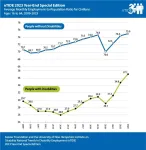(Press-News.org) A high quality diet at the age of 1 may curb the subsequent risk of inflammatory bowel disease, suggests a large long term study, published online in the journal Gut.
Plenty of fish and vegetables and minimal consumption of sugar-sweetened drinks at this age may be key to protection, the findings indicate.
A linked editorial suggests that it may now be time for doctors to recommend a ‘preventive’ diet for infants, given the mounting evidence indicative of biological plausibility.
Cases of inflammatory bowel disease (IBD), which includes Crohn’s disease and ulcerative colitis, are increasing globally. Although there is no obvious explanation for this trend, changes in dietary patterns are thought to have a contributory role, because of their impact on the gut microbiome.
While various studies have looked at the influence of diet on IBD risk in adults, there is little in the way of research on the potential influence of early childhood diet on risk.
In a bid to plug this knowledge gap, the researchers drew on survey data from the All Babies in Southeast Sweden study (ABIS) and The Norwegian Mother, Father and Child Cohort Study (MoBa).
ABIS includes 21,700 children born between October 1997 and October 1999; MoBa includes 114, 500 children, 95,200 mothers, and 75,200 fathers recruited from across Norway between 1999 and 2008.
Parents were asked specific questions about their children’s diet when they were aged 12-18 months and 30-36 months. The final analysis included dietary information for 81,280 1 year olds: 11,013 (48% girls) from ABIS and 70, 267 (49% girls) from MoBa.
Diet quality, gleaned from measuring intake of meat, fish, fruit, vegetables, dairy, sweets, snacks, and drinks, was assessed using a modified version of the Healthy Eating Index (HEI) scoring system, adapted for children. The weekly frequency of specific food groups was also assessed.
Higher diet quality—a higher intake of vegetables, fruit, and fish, and a lower intake of meat, sweets, snacks, and drinks—was reflected in a higher HEI score.The total score was divided into thirds to indicate a low, medium, or high quality diet.
Data on age at weaning, antibiotic use, and formula feed intake were also reported at age 12 (ABIS) and 18 months (MoBa).
The children’s health was monitored for an average of 21 (ABIS) and 15 (MoBa) years from the age of 1 until 31 December 2020-21.
During this period, 307 children were diagnosed with IBD (131 with Crohn's disease; 97 with ulcerative colitis; and 79 with unclassified IBD). The average age at diagnosis was 17 (ABIS) and 12 (MoB).
Medium and high quality diets at the age of 1 were associated with an overall 25% lower risk of IBD compared with a low quality diet at this age, after adjusting for potentially influential factors, such as parental history of IBD, the child’s sex, ethnic origin, and education and co-existing conditions in the mother.
Specifically, high fish intake at the age of 1 was associated with a lower overall risk compared with its opposite, and a 54% lower risk of ulcerative colitis in particular.
Higher vegetable intake at 1 year of age was also associated with a reduced risk of IBD. On the other hand, consumption of sugar-sweetened drinks was associated with a 42% heightened risk.
There were no obvious associations between any of the other food groups, including meat, dairy, fruit, grains, potatoes and foods high in sugar and/or fat, and overall IBD or Crohn’s disease or ulcerative colitis risks.
By the age of 3, only high fish intake was associated with reduced IBD risk, and ulcerative colitis in particular.
The findings remained unchanged after accounting for household income and the child’s formula intake and antibiotic use by the age of 1.
This is an observational study, and as such, can’t establish cause. And the researchers acknowledge that while the ABIS participation rate was high (79%), it was only 41% for MoBa. And because Sweden and Norway are two high-income countries, findings may not be generalisable to low- or middle-income countries with other dietary habits, they add.
“While non-causal explanations for our results cannot be ruled out, these novel findings are consistent with the hypothesis that early-life diet, possibly mediated through changes in the gut microbiome, may affect the risk of developing IBD,” they conclude.
In a linked editorial, gastroenterologist Dr Ashwin Ananthakrishnan of Massachusetts General Hospital, Boston, USA, cautions that the questionnaires didn’t capture elements, such as additives and emulsifiers which are common in baby food, and which may contribute to the development of IBD.
Accurate measures of food intake in infants and young children are inherently fraught with difficulty, he adds.
But he goes on to say that it may nevertheless be time to recommend a ‘preventive’ diet, particularly as this is likely to have other health benefits.
“Despite the absence of gold standard interventional data demonstrating a benefit of dietary interventions in preventing disease, in my opinion, it may still be reasonable to suggest such interventions to motivated individuals that incorporate several of the dietary patterns associated with lower risk of IBD from this and other studies.
“This includes ensuring adequate dietary fibre, particularly from fruit and vegetables, intake of fish, minimising sugar-sweetened beverages and preferring fresh over processed and ultra-processed foods and snacks.”
END
High quality diet in early life may curb subsequent inflammatory bowel disease risk
Diet rich in fish and veg, low in sugar-sweetened drinks at age of 1 may be key to protection. May be time for doctors to recommend ‘preventive’ diet for infants, editorialist suggests
2024-01-31
ELSE PRESS RELEASES FROM THIS DATE:
Next government should declare a national health and care emergency
2024-01-31
The government in post after the election should declare a national health and care emergency, calling on all parts of society to help improve health, care, and wellbeing, say experts in the first report of The BMJ Commission on the Future of the NHS.
The new government should, in effect, relaunch the NHS with a renewed long term vision and plan, they argue.
"The NHS has never seemed so embattled—and its core principle of ‘free to all at the point of use’ has never been so under threat,” said Kamran ...
Unprecedented success continues: 2023 employment gains for people with disabilities outshine those of counterparts without disabilities
2024-01-31
East Hanover, NJ – January 30, 2024 – Amidst the backdrop of a remarkable four-year streak of growth, the employment indicators for people with disabilities reached unprecedented milestones in 2023. This achievement stands in stark contrast to the experiences of people without disabilities who faced a more severe decline during the COVID-19 pandemic and a slower recovery, not surpassing their pre-pandemic employment levels until 2023. That’s according to the National Trends in Disability Employment (nTIDE) 2023 Year-End Special Edition, ...
Scientists pinpoint growth of brain’s cerebellum as key to evolution of bird flight
2024-01-31
**EMBARGOED UNTIL 7:01 P.M. ET TUESDAY, JAN 30**
Evolutionary biologists at Johns Hopkins Medicine report they have combined PET scans of modern pigeons along with studies of dinosaur fossils to help answer an enduring question in biology: How did the brains of birds evolve to enable them to fly?
The answer, they say, appears to be an adaptive increase in the size of the cerebellum in some fossil vertebrates. The cerebellum is a brain region responsible for movement and motor control.
The research findings are published in the Jan. 31 issue of the Proceedings of the Royal Society B.
Scientists have long thought that the cerebellum should be important ...
Machine learning informs a new tool to guide treatment for acute decompensated heart failure
2024-01-30
A recent study co-authored by Dr. Matthew Segar, a third-year cardiovascular disease fellow at The Texas Heart Institute and led by his research and residency mentor, University of Texas Southwestern Medical Center’s Dr. Ambarish Pandey, utilized a machine learning-based approach to identify, understand, and predict diuretic responsiveness in patients with acute decompensated heart failure (ADHF).
The study “A Phenomapping Tool and Clinical Score to Identify Low Diuretic Efficiency in Acute Decompensated ...
Clear legal rules about the use of sperm and eggs in fertility treatment must remain to protect the vulnerable, study says
2024-01-30
Clear legal rules outlining the use of the sperm and eggs of those who are incapacitated must remain in place to protect the vulnerable from being involved in fertility treatment without their consent, a new study says.
There are strict laws in England and Wales involving the use of reproductive materials, but the research outlines how recent court cases have weakened this existing rigorous consent regime.
It warns this could create a common law exception to informed consent, leaving the current law in a delicate position. The research says it is “not outside the realms of possibility” that some people may try to take ...
New interview with Eric Topol, MD, on the state of artificial intelligence in precision oncology
2024-01-30
An interview with Eric J. Topol, MD, a world-renowned cardiologist, best-selling author of several books on personalized medicine, and the founder and director of the Scripps Research Translational Institute in La Jolla, California, has been published. in the new peer-reviewed journal, AI in Precision Oncology. Dr. Topol is an advocate for using digital technologies and artificial intelligence in health care. click here to read the interview now.
Douglas Flora, MD, Editor-in-Chief of AI in Precision Oncology, interviewed Dr. ...
Rotman School Professor named to Thinkers50 Radar Class
2024-01-30
Rotman School Professor Named to Thinkers50 Radar Class
Toronto – Maja Djikic, an associate professor of organizational behaviour and human resource management at the University of Toronto’s Rotman School of Management, has been named to the Thinkers50 Radar class for 2024.
Announced every January, the Thinkers50 Radar identifies a cohort of 30 up-and-coming thinkers from around the world whose ideas have the potential to make an important impact on management thinking in the future.
A personality psychologist specializing in adult development, Prof. Djikic is executive director of the Self-Development Lab at the Rotman School, which provides ...
Researchers find early symptoms of psychosis spectrum disorder in youth higher than expected
2024-01-30
A new study co-led by Associate Professor Kristin Cleverley of the Lawrence Bloomberg Faculty of Nursing has found evidence that Psychosis Spectrum Symptoms (PSS) are often present in youth accessing mental health services.
From a profile of the initial 417 youth aged 11-24 participating in the study, 50 per cent were shown to meet the threshold for Psychosis Spectrum Symptoms, a number Cleverley says was higher than expected, meaning there is a large number of children with these symptoms accessing mental health services.
Cleverley, ...
Pitt receives new grant to improve opioid use disorder treatment
2024-01-30
PITTSBURGH – The University of Pittsburgh School of Pharmacy’s Program Evaluation and Research Unit (PERU) has received a five-year, $7.8 million grant from the National Institute on Drug Abuse to improve quality of care for patients with opioid use disorder across Pennsylvania.
The project will establish the Helping to End Addiction Long-term (HEALing) Measures Center at Pitt, which will focus on developing and implementing measurement-based care into 20 community opioid treatment programs across Pennsylvania with the goal of enhancing treatment ...
Researchers craft new way to make high-temperature superconductors – with a twist
2024-01-30
An international team that includes Rutgers University–New Brunswick scientists has developed a new method to make and manipulate a widely studied class of high-temperature superconductors.
This technique should pave the way for the creation of unusual forms of superconductivity in previously unattainable materials.
When cooled to a critical temperature, superconductors can conduct electricity without resistance or energy loss. These materials have intrigued physicists for decades because they can achieve a state of ...
LAST 30 PRESS RELEASES:
Black soldier fly larvae show promise for safe organic waste removal
People with COPD commonly misuse medications
How periodontitis-linked bacteria accelerate osteoporosis-like bone loss through the gut
Understanding how cells take up and use isolated ‘powerhouses’ to restore energy function
Ten-point plan to deliver climate education unveiled by experts
Team led by UC San Diego researchers selected for prestigious global cancer prize
Study: Reported crop yield gains from breeding may be overstated
Stem cells from human baby teeth show promise for treating cerebral palsy
Chimps’ love for crystals could help us understand our own ancestors’ fascination with these stones
Vaginal estrogen therapy not linked to cancer recurrence in survivors of endometrial cancer
How estrogen helps protect women from high blood pressure
Breaking the efficiency barrier: Researchers propose multi-stage solar system to harness the full spectrum
A new name, a new beginning: Building a green energy future together
From algorithms to atoms: How artificial intelligence is accelerating the discovery of next-generation energy materials
Loneliness linked to fear of embarrassment: teen research
New MOH–NUS Fellowship launched to strengthen everyday ethics in Singapore’s healthcare sector
Sungkyunkwan University researchers develop next-generation transparent electrode without rare metal indium
What's going on inside quantum computers?: New method simplifies process tomography
This ancient plant-eater had a twisted jaw and sideways-facing teeth
Jackdaw chicks listen to adults to learn about predators
Toxic algal bloom has taken a heavy toll on mental health
Beyond silicon: SKKU team presents Indium Selenide roadmap for ultra-low-power AI and quantum computing
Sugar comforts newborn babies during painful procedures
Pollen exposure linked to poorer exam results taken at the end of secondary school
7 hours 18 mins may be optimal sleep length for avoiding type 2 diabetes precursor
Around 6 deaths a year linked to clubbing in the UK
Children’s development set back years by Covid lockdowns, study reveals
Four decades of data give unique insight into the Sun’s inner life
Urban trees can absorb more CO₂ than cars emit during summer
Fund for Science and Technology awards $15 million to Scripps Oceanography
[Press-News.org] High quality diet in early life may curb subsequent inflammatory bowel disease riskDiet rich in fish and veg, low in sugar-sweetened drinks at age of 1 may be key to protection. May be time for doctors to recommend ‘preventive’ diet for infants, editorialist suggests






